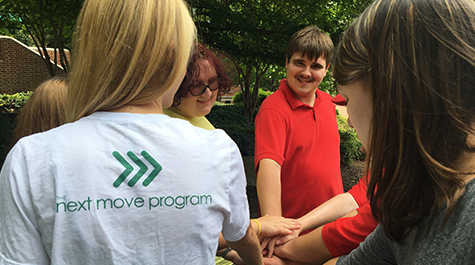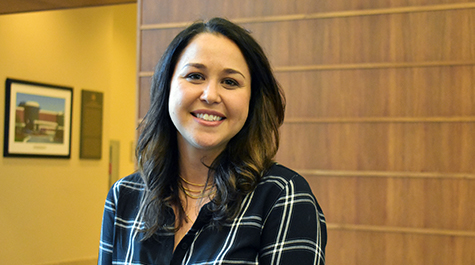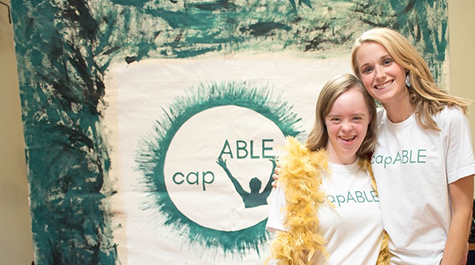Next Move @ W&M will bring campus-based internship opportunities for young adults with disabilities
This fall, a new partnership will bring guided internship opportunities for young adults with disabilities to the William & Mary campus. Funded by a grant from the Virginia Board for People with Disabilities, the project will not only help the local diverse-ability community build skills for sustained employment, but its leaders also hope it will foster broad conversations about the role and value of neurodiversity in the community.
Next Move @ W&M will provide campus-based internships, in addition to special instruction and job coaching, for 36 young adults with developmental disabilities over the next two years. William & Mary faculty members Heartley Huber and Jackie Rodriguez, both assistant professors of special education, will supervise the program, conduct research and evaluation, and engage the campus community in conversations to promote awareness and break down prejudices around people with disabilities.
“We know these internships will make a huge difference for the participants, but it’s also an extraordinary opportunity to promote a cultural shift in our community and build toward greater acceptance of people with diverse abilities,” said Huber. “We’re so excited to get started.”
Alumni connections
The program at William & Mary is an extension of Next Move Program, a non-profit founded by Elizabeth Redford M.A.Ed. ’10 and Mary Townley. Both former special education teachers, Redford and Townley founded the organization to help address the high unemployment rate of adults with disabilities — which in Virginia hovers around 70%.
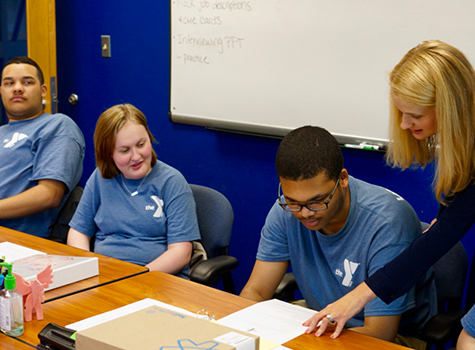 Through partnerships with businesses and organizations in central Virginia, including Quirk Hotel, The Greater Richmond YMCA, and Wells Fargo Advisors, Next Move has set the standard for transitional instruction and training for the diverse abilities community in the greater Richmond area.
Through partnerships with businesses and organizations in central Virginia, including Quirk Hotel, The Greater Richmond YMCA, and Wells Fargo Advisors, Next Move has set the standard for transitional instruction and training for the diverse abilities community in the greater Richmond area.
Guided internships provide on-the-job training and a specially developed curriculum offers interns a deeper understanding of concepts required for acquiring and maintaining employment. Topics include safety training, goal setting, body language, appropriate workplace dress and conversation, resume writing, and interviewing.
The organization reports that 80% of its graduates have secured opportunities for further post-secondary education or competitive employment.
“Our interns make tremendous gains, as they are learning concepts in the most authentic setting by training and learning in an actual business among working professionals,” said Redford. “And the relationships that employees form with our students are transformative, opening minds and hearts to what individuals with disabilities are capable of in our community.”
The William & Mary partnership
A college campus is the ideal location for an internship program, and Redford was excited to hear of interest at William & Mary to bring Next Move to Williamsburg.
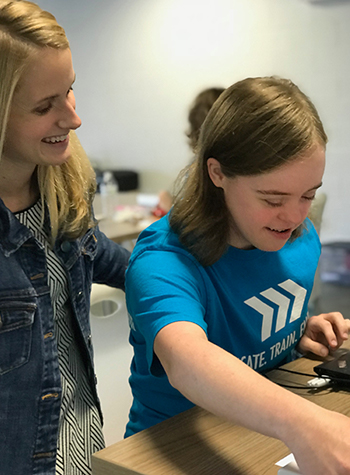 “A college environment provides a variety of departments and industries for job training, a deep commitment to education and community partnerships, and an appreciation of the evidence-based practices that our program is founded on,” she said. “Drs. Rodriguez and Huber both excel in research design and program development, and they have a sincere passion for addressing the staggering unemployment rates for the differing abilities community. William & Mary is an ideal match for our program.”
“A college environment provides a variety of departments and industries for job training, a deep commitment to education and community partnerships, and an appreciation of the evidence-based practices that our program is founded on,” she said. “Drs. Rodriguez and Huber both excel in research design and program development, and they have a sincere passion for addressing the staggering unemployment rates for the differing abilities community. William & Mary is an ideal match for our program.”
The team applied for funding from the Virginia Board for People with Disabilities and received $150,000 for the two-year program. The funding will support one teacher and an aid, who will provide the job coaching and instructional components. Each internship will last 12 weeks, with interns spending 10 hours on the job and 20 hours in instruction weekly.
Interns will be carefully matched to jobs on the William & Mary campus that fit their skills, interests and work aspirations. “People with disabilities often don’t get as many opportunities to explore the working world — the internships, part-time jobs and volunteer experiences that help us figure out what we want to do,” explained Huber. “So, a big goal for our students will be to explore their interests, build off what they know, and gain new skills.”
Interns will be placed throughout campus, in departmental and administrative offices, dining services, facilities management, libraries, and more.
“William & Mary has a deep commitment to inclusive hiring practices,” said John Poma, chief human resources officer at William & Mary. “Next Move will provide the opportunity for W&M employees to form transformative relationships with young adults with disabilities. I can’t think of a better program to bring to W&M to add to the richness and diversity of our campus community.”
The research component
Data collection and evidence-based practices are already embedded in Next Move’s curriculum and program. With the larger sample and bigger reach of the new partnership with William & Mary, the team is poised to take a holistic look at the data, refining the curriculum and identifying the very best model to help this population prepare for sustained employment.
Huber also plans to host community conversations, which will convene 50-80 people from a broad range of backgrounds and experiences with the diverse abilities community, to discuss the needs of young adults with disabilities as they transition to the workforce. “It’s not just about increasing awareness, it’s also about building community-based motivation— the idea that we all have a role in making our community more inclusive,” she said.
The team’s ultimate goal is to create a model that can be replicated on other university campuses and exponentially increase its impact. “We hope that one day the program will be successfully implemented all across the country, setting a standard for vocational training and research in the field of special education,” said Redford.
